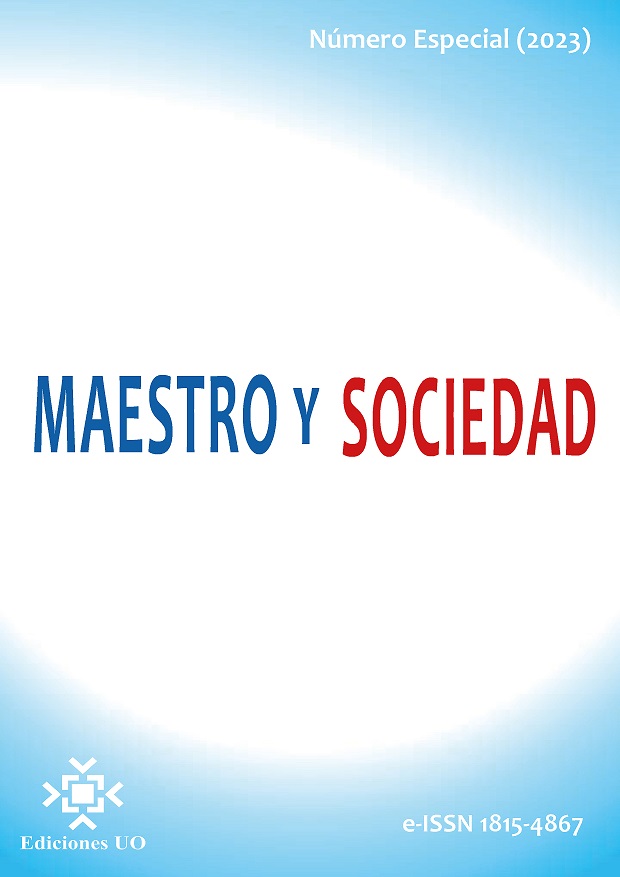Meaningful learning of reading and writing in basic education
Keywords:
Comprehensive Understanding. Skills. Strategies. Aesthetic experienceAbstract
This research aims to explore the influence of methodological strategies on meaningful literacy learning in basic
education. In the field of literacy, much remains to be discovered, both regarding the processes involved and the
associated neurological functions. There are uncertainties about the most effective ways to teach these foundational
skills and how to approach more effective teaching practices.The proposed hypothesis suggests that the use of specific
and appropriate strategies can significantly contribute to the teaching and learning process, enabling students to develop
effective skills to communicate their ideas clearly and coherently in real-life contexts. To conduct this research, a mixed
research approach combining qualitative and quantitative methods is adopted. This involves starting with a matrix of
operationalization of variables based on precise definitions of key concepts. Additionally, tools such as questionnaires
and surveys directed at school administrators, teachers, and parents are employed to systematically collect data. The
findings of this research highlight the value of written assessments but also suggest exploring personalized approaches.
There is a focus on balancing the preference for receptive learning with a willingness to combine approaches and foster
autonomy. Furthermore, the importance of considering the richness of reading activity and addressing the limited
familiarity with the 'aesthetic experience' is emphasized to enrich teaching practices, involving both teachers and
parents in this process.
References
Barros, D. F. (2 de Sep de 2023). Leer y escribir, dos verbos todavía pendientes luego de Emilia Ferreiro. Infobae, pp. 1 - 3.
Córdoba, M. (2020). El constructivismo sociocultural lingüístico como teoría pedagógica de soporte para los Estudios Generales. Revista Nuevo Humanismo, 8. doi:http://dx.doi.org/10.15359/rnh.8-1.4
Feria, H., Matilla, M., & Mantecón, S. (2020). LA ENTREVISTA Y LA ENCUESTA: ¿MÉTODOS O TÉCNICAS DE INDAGACIÓN EMPÍRICA? Didáctica Y Educación, 11(3), 62–79., 62 - 79.
Garcés, L., Montaluisa, A., & Salas, E. (2018). El aprendizaje significativo y su relación con los estilos de aprendizaje. https://www.593dp.com/index.php/593_Digital_Publisher/article/download/1014/966/8212
Gil, J. (2019). Lectoescritura como sistema neurocognitivo. Educación y Educadores, 22, 422-447. doi:https://doi.org/10.5294/edu.2019.22.3.5
Gómez, L., Muriel, L., & Londoño, D. (2019). El papel del docente para el logro de un aprendizaje significativo apoyado en las TIC. Encuentros, 17(2), 118-131.
Hernández, L., & Betancourt, G. (2021). Valor didáctico de la simpatía para el goce estético de la lectura literaria. Transformación, 13 - 26.
Huepe, M., Palma, A., & Trucco, D. (2022). Educación en tiempos de pandemia. https://repositorio.cepal.org/server/api/core/bitstreams/e66c7b0e-41da-4a4a-be97-543097fccfb1/content
Maina, M., & Papalini, V. (2021). Hacia una revisión del concepto. Álabe(23). https://dialnet.unirioja.es/servlet/articulo?codigo=7698182
Martines Quijano Maria Cristina, D. U. (2018). Aproximación neuropsicológica a las dificultades en la lectoescritura. Innovacion Psicologica: Salud, educacion y cultura, 177 - 201.
Miguel, D. Z. (s.f.). TEORÍA DE LAS SEIS LECTURAS. MECANISMOS DEL. Santafé de Bogotá.
OCDE (Organización para la Cooperación y el Desarrollo Económico). (2006). El programa PISA de la OCDE. Qué es y para qué sirve? Obtenido de https://www.oecd.org/pisa/39730818.pdf
Pesqueria, L., Castañeda, J., Rodríguez, A., Rodríguez, M., & Mar, S. (2019). Proceso de Lectura y Escritura en alumnos de la Facultad de Psicología y TCH UJED. Praxis Educativa, 61-65. Obtenido de https://core.ac.uk/download/pdf/235863792.pdf
Poblete, J. (2017). Qué es, qué fue y cuál es el futuro? Orbis Tertius, 22(26).
Riaño, M., Torrado, J., Díaz, E., & Espinosa, J. (2018). Innovación psicológica: Salud, educación y cultura. Barranquilla: Mejores.
Sánchez Flores, F. A. (2019). Fundamentos epistémicos de la investigación cualitativa y cuantitativa: Consensos y disensos. Revista Digital deinvestigacion en Docencia Univ. 13(1), 102 - 122.
Shanahan, T. (2020). WHAT COSNSTITUTES A SCIENCE OF READING INSTRUCTIONS? INTERNATIONAL LITERACY ASSOCIATION, 4.
Southwell, M., Imen, P., & Baez, M. (2019). Bitácoras de la innovación pedagógica. En M. Baez, La vigencia de las contribuciones de Los sistemas de escritura en el desarrollo del niño de Emilia Ferreiro y Ana Teberosky (pp. 57 - 84). Argentina: Ministerio de Educación de la Provincia de Santa Fe.
Teberosky, A. (2000). LOS SISTEMAS DE ESCRITURA. Congreso Mundial de Lecto-escritura (pp. 1 - 15). Universidad de Barcelona.
ULEAM (Universidad Laica Eloy Alfaro de Manabi). (2023). Guía Didáctica - Aprendizaje de la comunicación humana. https://www.studocu.com/ec/document/tecnologico-argos/informatica/libro-semana-7-8/61262954
Published
How to Cite
Issue
Section
License
Copyright (c) 2023 Ruth Elena Vera Ramos, Genny Elizabeth Zambrano Gallardo

This work is licensed under a Creative Commons Attribution-NonCommercial-NoDerivatives 4.0 International License.
This journal provides immediate open access to its content, based on the principle that offering the public free access to research helps a greater global exchange of knowledge. Each author is responsible for the content of each of their articles.



























 Universidad de Oriente
Universidad de Oriente 